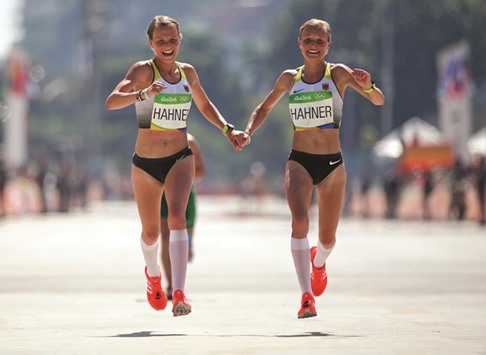German running twins Anna and Lisa Hahner crossed the Rio women’s marathon finish line hand-in-hand but their spontaneous move has not been universally seen as a celebration of the Olympic ideal.
The media-savvy pair are feeling the wrath of their sports federation for their double finish down the field in 81st and 82nd, and their slow times.
However, they only ran together for 3 or 4 kilometres of the marathon and just rejoined in the final few hundred metres of the race.
The harsh criticism highlights how hard it is for athletes to finance themselves with self-promotion while maintaining the image of being serious about their sport.
“You go for a walk hand-in-hand, but not in an Olympic marathon,” said Thomas Kurschilgen, the sports director of the German Athletics Association (DLV).
Their behaviour was “disrespectful and a slap into the face of all other German Olympic athletes,” he added.
Anna Hahner completed the 26.2-mile course in 2 hours 45 minutes and 32 seconds, with Lisa timed in one second later — more than 20 minutes behind winner Jemima Sumgong and both well outside of their personal bests.
But the blistering heat of Rio meant personal bests were set by only a handful of athletes while others required more than 3 hours to finish and around two dozen quit mid-race.
And even if the Hahners had found an optimal performance on the day, they were never going to challenge for medals — so why not enjoy the moment of a lifetime together as twins? After all, the Olympic ideal celebrates the achievement of taking part in sport rather than just the winning.
“We had hoped to be a bit faster, but the time became less important as the race progressed,” Anna said afterwards.
Anna hit back at criticism, her response coming the same day she was awarded a belated victory from Hanover.
“It is a special coincidence that I’m getting that news now, the week after the Olympic marathon,” Anna posted on the website she shares with twin Lisa. “A marathon that was one of my toughest physical experiences.”
Anna Hahner was promoted to the winner of the Hanover marathon from April this year after first-place finisher Edinah Jerotich Kwambai was deemed by the IAAF governing athletics body to have had an excessive amount of salbutamol in her system.
“The critics don’t accept that we finished side by side after 42.1 kilometres of tough racing against ourselves and the conditions here in Rio,” Anna Hahner said. “To make sure that we wouldn’t have lost a single tenth of a second we held each other’s hands instead of extending our elbows. We sprinted hand in hand. We didn’t think but acted how we felt in this moment.”
The 26-year-old sisters are two of the best known German track and field athletes in their home country, thanks to an elaborate public relations strategy that comes complete with a website on which Lisa and Anna share healthy recipes and fitness tips.
They have published a runner’s book ahead of the Rio de Janeiro Games, they have their own running and fitness app, and they invite their fans to join their Hahnertwins Club for special events and individual athletics tips.
Contrary to other German track and field athletes, the two young women have decided to finance their place in this less than lucrative sport with the help of sponsors and self-promotion, rather than through Germany’s national sponsoring programme.
The DLV has complained that the sisters spend too much attention on promotion and not enough on their sport.
It is worth noting that Germany’s other women’s marathon entrant, the 44th-placed Anja Scherl, makes a living with a full-time career as a software developer in addition to running.
The Hahners were not the only twins in the race and in the limelight in Rio.
North Korea’s Kim Hye Song and Kim Hye Gyong finished 10th and 11th with the exact same time of 2 hours 28 minutes and 36 seconds. And then there were the Estonian triplets Leila, Liina und Lily Luik. While Liina had to give up during the run, Leila finished 114th and Lily 97th.

German twins Anna (left) and Lisa Hahner finish the Marathon final. (Reuters)


